Overview
The article identifies and discusses ten transformative trends in AI-powered proptech, specifically focusing on their impact on title research and various facets of the real estate industry. It underscores the significance of accurate title research as a foundational element in real estate transactions, while also addressing the challenges that have historically hindered efficiency and accuracy.
Technologies such as:
- machine learning
- generative AI
- blockchain
- digital twins
- predictive analytics
are highlighted as pivotal tools enhancing operational efficiency, improving accuracy, and fostering customer engagement. These advancements are not merely innovations; they are reshaping the property management landscape, offering solutions that address long-standing issues within the industry.
Ultimately, this article serves as a compelling call to action for real estate professionals to embrace these technologies. By doing so, they can navigate the complexities of modern property management with greater ease and effectiveness, ensuring they remain competitive in an evolving market.
Introduction
The intersection of artificial intelligence and property technology is reshaping the landscape of real estate, ushering in a new era of efficiency and innovation. As industry professionals navigate the complexities of title research and property management, AI-powered solutions are emerging as essential tools that streamline operations and enhance customer engagement.
Furthermore, with these advancements come pressing questions about the implications for traditional practices and the future of the real estate market. What are the key trends driving this transformation, and how can stakeholders leverage these technologies to stay ahead in a rapidly evolving environment?
This inquiry not only highlights the challenges faced but also underscores the potential benefits of embracing such innovations.
Parse AI: Revolutionizing Title Research with Machine Learning
Parse AI harnesses advanced machine learning algorithms to meticulously analyze and extract critical data from extensive title documents. This innovative technology drastically reduces the time required for title research, empowering professionals to concentrate on more strategic tasks. Furthermore, by automating data extraction, Parse AI minimizes human error and significantly enhances the accuracy of title reports. Consequently, it emerges as an invaluable tool for real estate professionals who prioritize efficiency and reliability in their workflows.
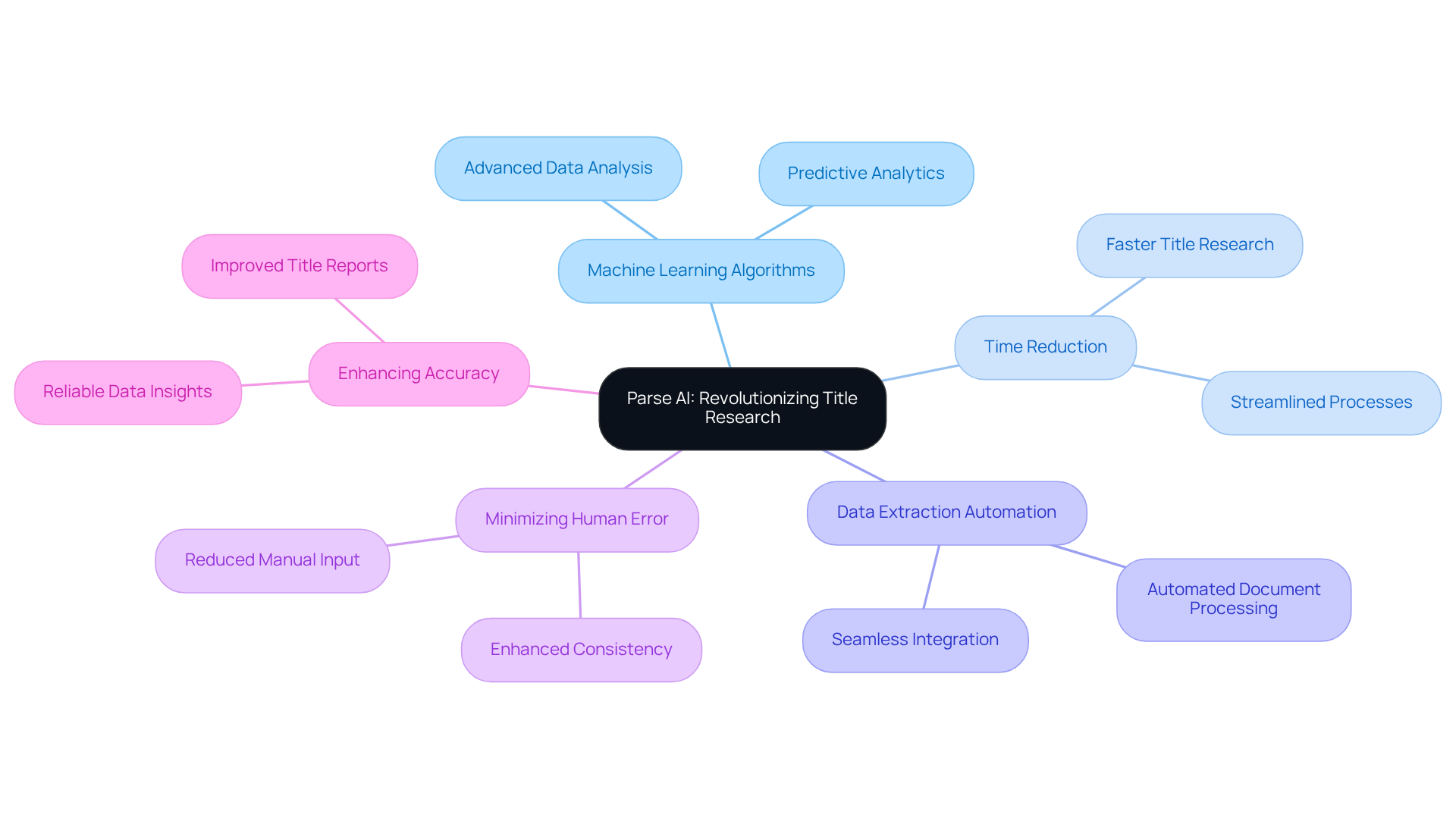
Generative AI: Transforming Property Management and Customer Engagement
Generative AI is revolutionizing real estate management by automating routine tasks and significantly enhancing customer interaction. At the forefront of this transformation are AI-driven chatbots, adeptly managing resident inquiries, scheduling maintenance, and providing instant responses. This capability has been shown to boost resident satisfaction, with managers reporting a 27% increase in customer contentment through the use of Convin's AI Phone Calls.
Furthermore, generative AI analyzes occupant data to tailor communication and marketing strategies, enabling managers to meet client needs more efficiently while improving operational effectiveness. For instance, AI chatbots engage tenants with personalized notifications and reminders, ensuring that no query goes unanswered, as Convin's AI Phone Calls specifically guarantee that tenant inquiries are addressed.
Consequently, managers can focus on strategic initiatives, confident that routine interactions are effectively managed by AI.
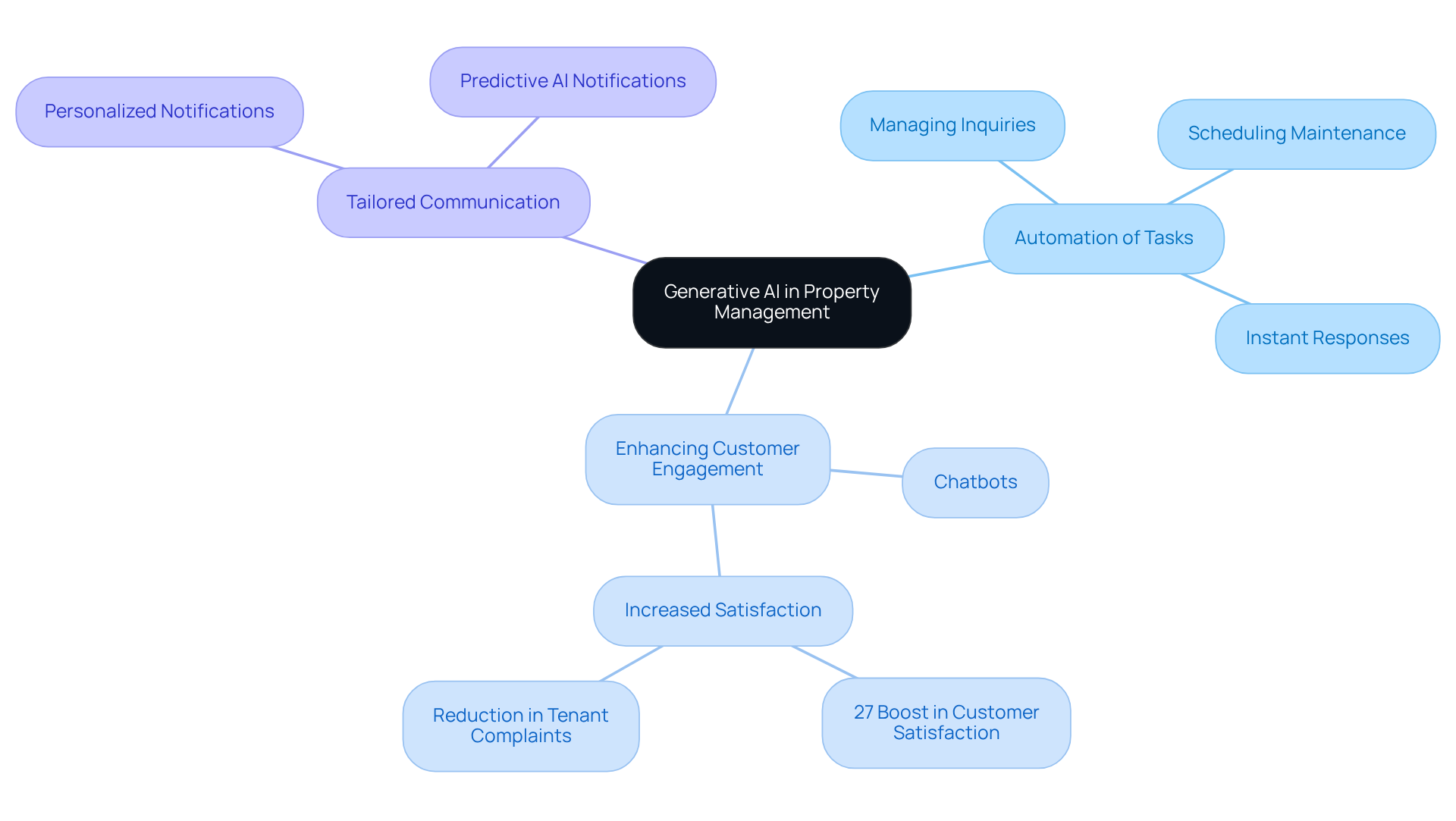
Blockchain Technology: Ensuring Secure and Transparent Property Transactions
Blockchain technology is fundamentally transforming real estate transactions by establishing a secure and immutable ledger for ownership and transaction histories. This level of transparency significantly reduces the risk of fraud and disputes, as all parties involved can easily confirm the authenticity of title documents. Furthermore, the implementation of smart contracts automates transaction processes, ensuring that all stipulated conditions are satisfied before funds are released. This not only streamlines the closing process but also fosters greater trust among stakeholders.
In addition, blockchain's capacity to deliver a transparent and tamper-resistant record has been essential in property fraud prevention. Case studies demonstrate that its implementation has resulted in a significant reduction in deceptive actions. As the sector continues to adopt these innovations, the influence of blockchain on transaction security is becoming increasingly apparent. Consequently, this paves the way for a more efficient and reliable real estate market.
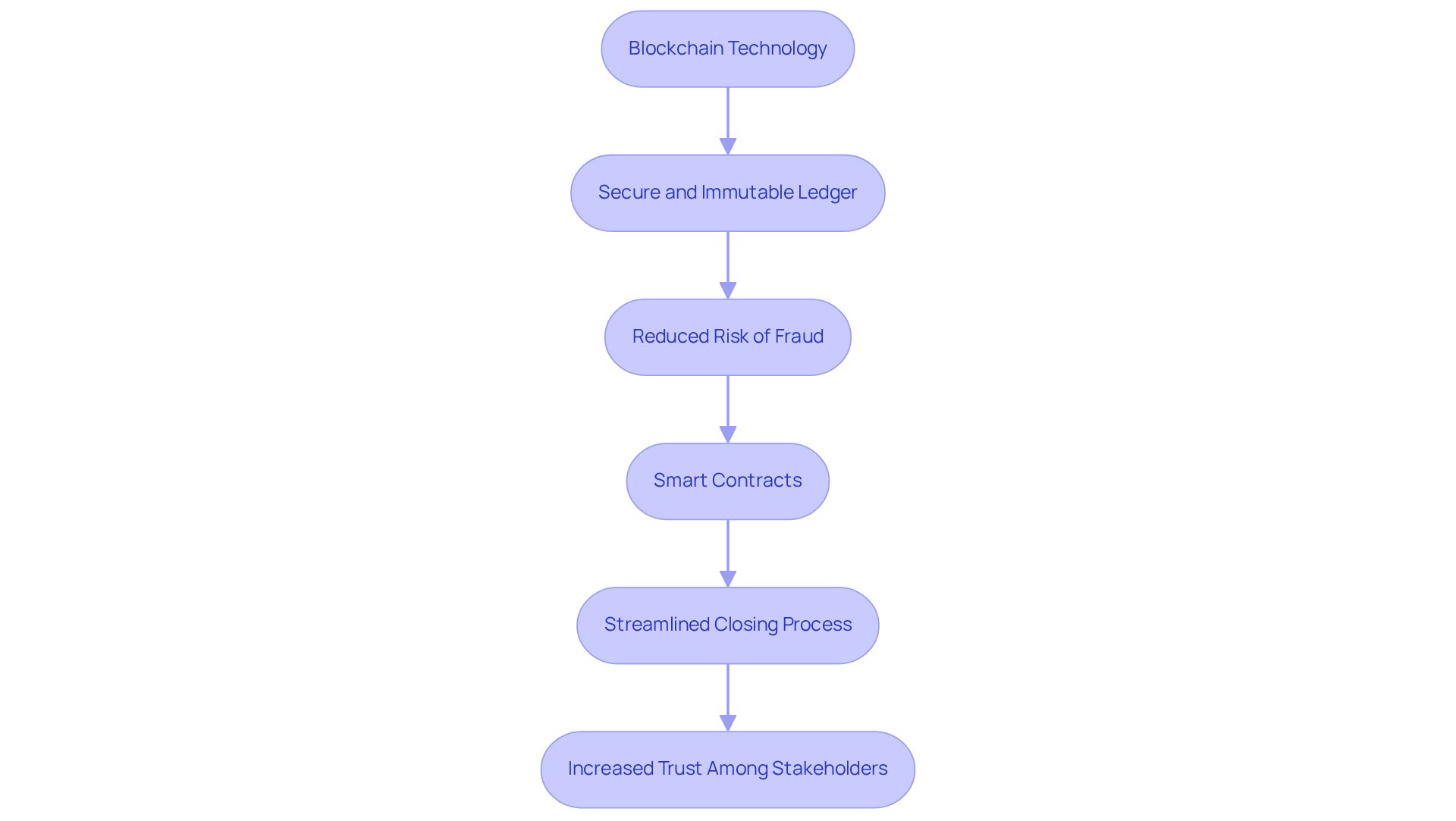
Digital Twins: Enhancing Real Estate Development through Virtual Modeling
Digital twins serve as virtual representations of physical characteristics, enabling developers to model various scenarios and evaluate potential outcomes prior to construction. This groundbreaking technology significantly enhances project planning, resource allocation, and risk management, leading to more efficient execution. By visualizing the complete lifecycle of an asset, stakeholders can make informed decisions that greatly improve sustainability and operational efficiency.
For instance, digital twins have demonstrated their capability to reduce construction waste by accurately estimating material requirements. This is particularly crucial in an industry where as much as 30% of materials can be wasted. Furthermore, developers employing digital twins report enhanced building performance and reduced operating expenses, making their assets more appealing to tenants.
As the digital twin market is projected to grow from USD 24.5 billion in 2025 to USD 259.3 billion by 2032, it is noteworthy that over 50% of firms implementing digital twins indicate at least a 20% return on investment. Consequently, the benefits of virtual modeling in real estate development are becoming increasingly clear.
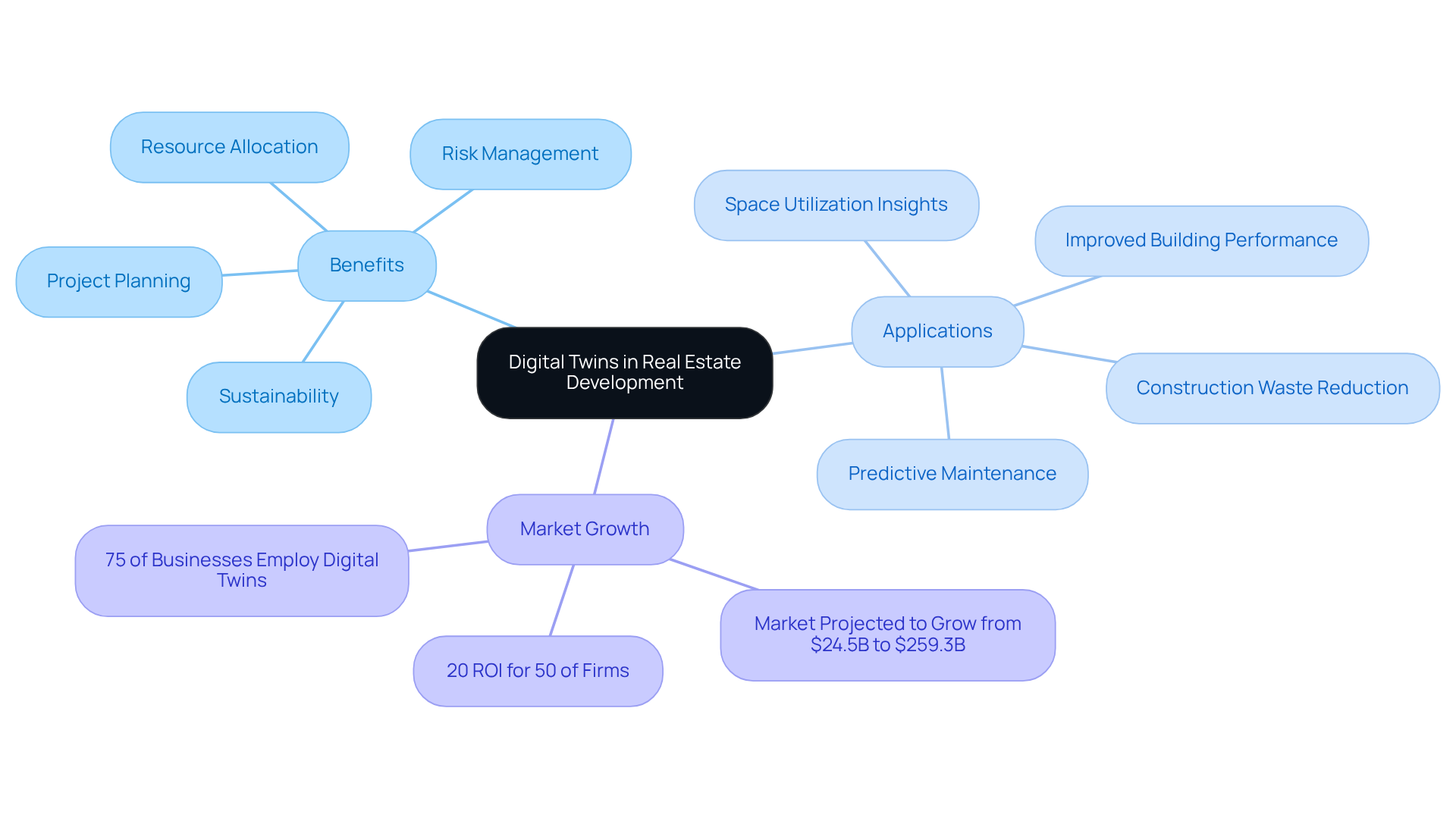
Green Proptech: Integrating Sustainability into Building Systems
Green proptech is revolutionizing the integration of sustainable practices into building systems, encompassing energy-efficient HVAC systems, smart lighting, and advanced water conservation technologies. These innovations significantly decrease the environmental impact of buildings while simultaneously lowering operational expenses. For instance, properties that implement energy-efficient systems can experience a reduction in utility expenses, thereby enhancing overall profitability.
Furthermore, embracing eco-friendly technologies not only attracts environmentally conscious occupants but also boosts overall resident satisfaction, as individuals increasingly prioritize sustainability in their living spaces. Ongoing tenant education is essential for long-term sustainability, ensuring that residents are engaged and informed about energy-saving practices. By positioning themselves as leaders in sustainability, property professionals can enhance their market appeal and secure a competitive edge in an evolving industry landscape.
As Phil Harding emphasizes, "21st Century choice: Look after our planet, and it will look after us, or don't and face the consequences." This underscores the critical importance of sustainability in the future of property.
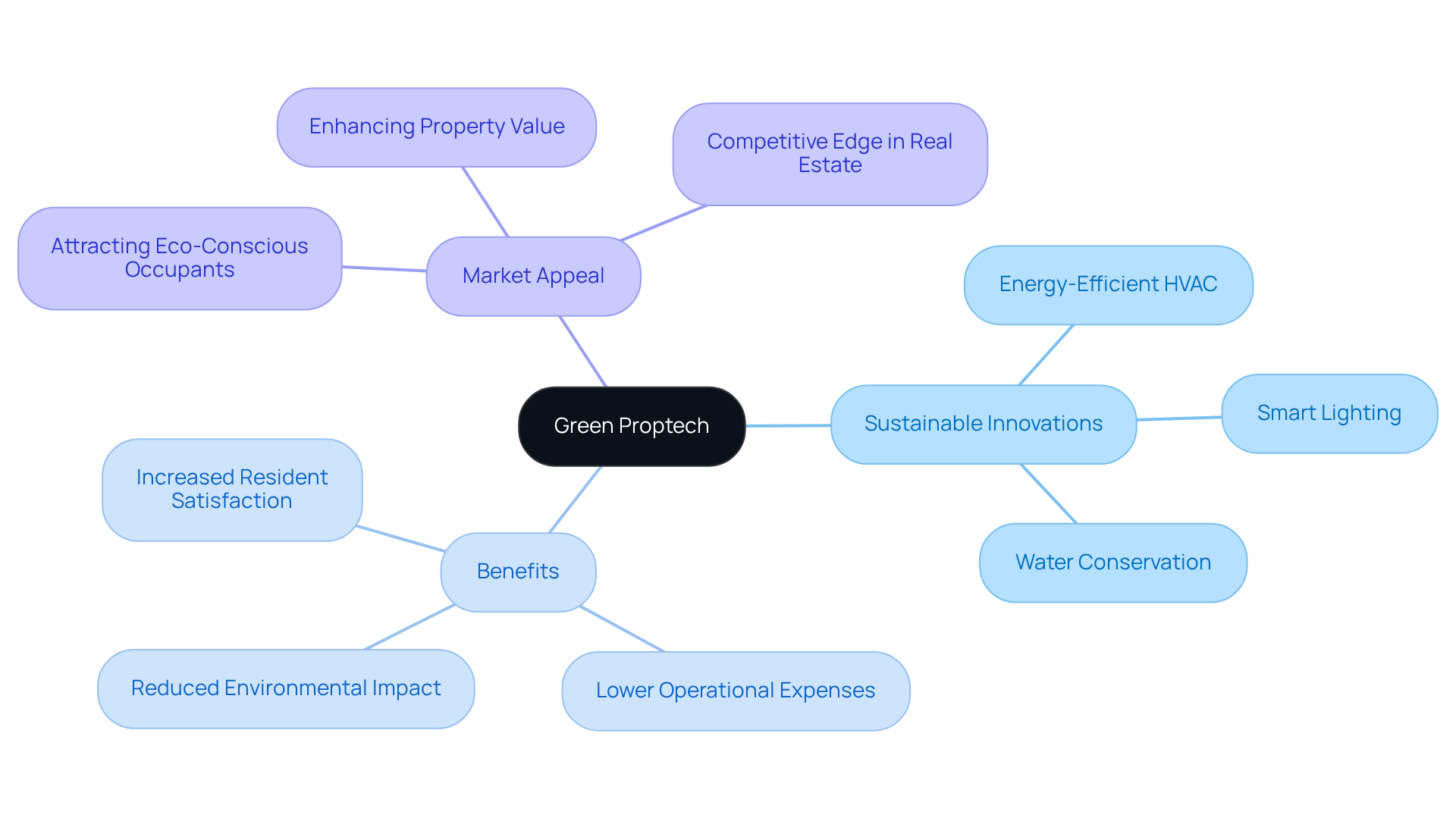
Predictive Analytics: Forecasting Market Trends for Informed Investments
Predictive analytics harnesses historical data and machine learning algorithms to anticipate market trends, empowering property professionals to make informed investment decisions. By scrutinizing variables such as property values, rental demand, and economic indicators, investors can identify emerging opportunities and enhance their strategies. This data-driven approach not only mitigates risks but also amplifies potential returns, positioning predictive analytics as an essential resource in the competitive landscape of property.
Furthermore, over 72% of property companies leverage predictive analytics to uncover investment opportunities, equipping these firms to navigate risks and capitalize on market fluctuations. Companies that incorporate predictive insights into their strategic planning consistently outperform their competitors, particularly in volatile markets. As the predictive AI market is projected to reach $108 billion by 2033, expanding at an annual rate of 21.9% from 2024 to 2033, the importance of data-informed investment choices in property cannot be overstated.
In addition, machine learning, which commands a 52% share of the predictive AI market, plays a pivotal role in enhancing the accuracy and effectiveness of these analytics.
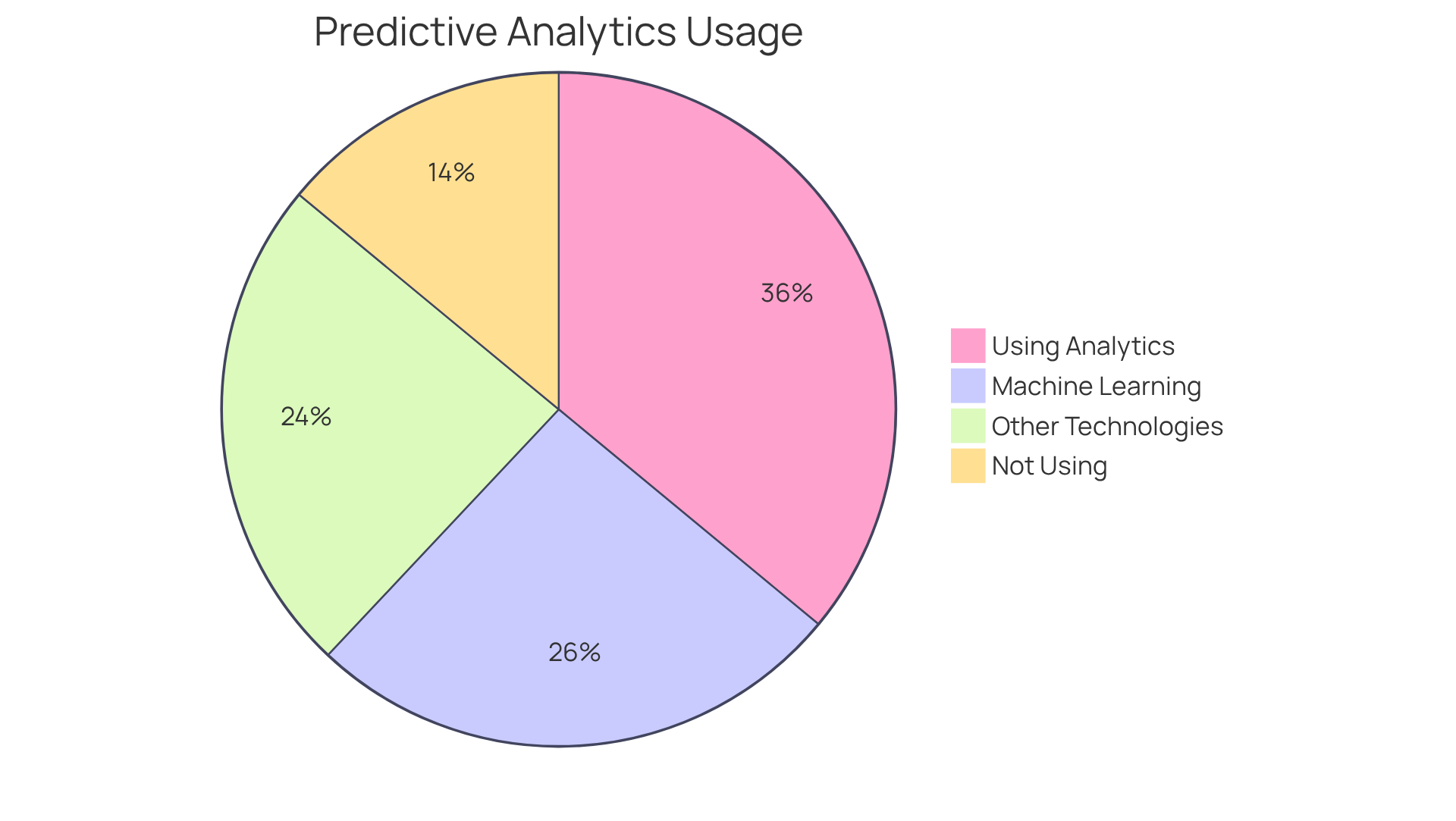
AI-Driven Marketing: Targeting Buyers with Data-Driven Strategies
AI-driven marketing strategies are revolutionizing how property professionals engage with potential purchasers through the utilization of data analytics for more effective targeting. By analyzing consumer behavior and preferences, these strategies facilitate the creation of personalized marketing campaigns that resonate deeply with audiences. AI tools automate content creation, optimize ad placements, and track engagement metrics, ensuring that marketing efforts are both efficient and impactful.
As Shalwa observes, 'AI is changing the property market by making acquisition, selling, and management more intelligent and effective.' This targeted approach not only increases lead generation—AI chatbots can enhance lead generation in property by 33%—but also significantly improves the overall customer experience. Indeed, customized lead systems can boost sales by as much as 20%, showcasing the tangible advantages of data-driven marketing within the property sector.
As the industry evolves, embracing these innovative strategies will be crucial for maintaining competitiveness and addressing the needs of modern buyers. Furthermore, the global AI real estate market is projected to reach USD 41.5 billion by 2033, growing at a CAGR of 30.5%, underscoring the necessity of adopting AI-driven marketing strategies.
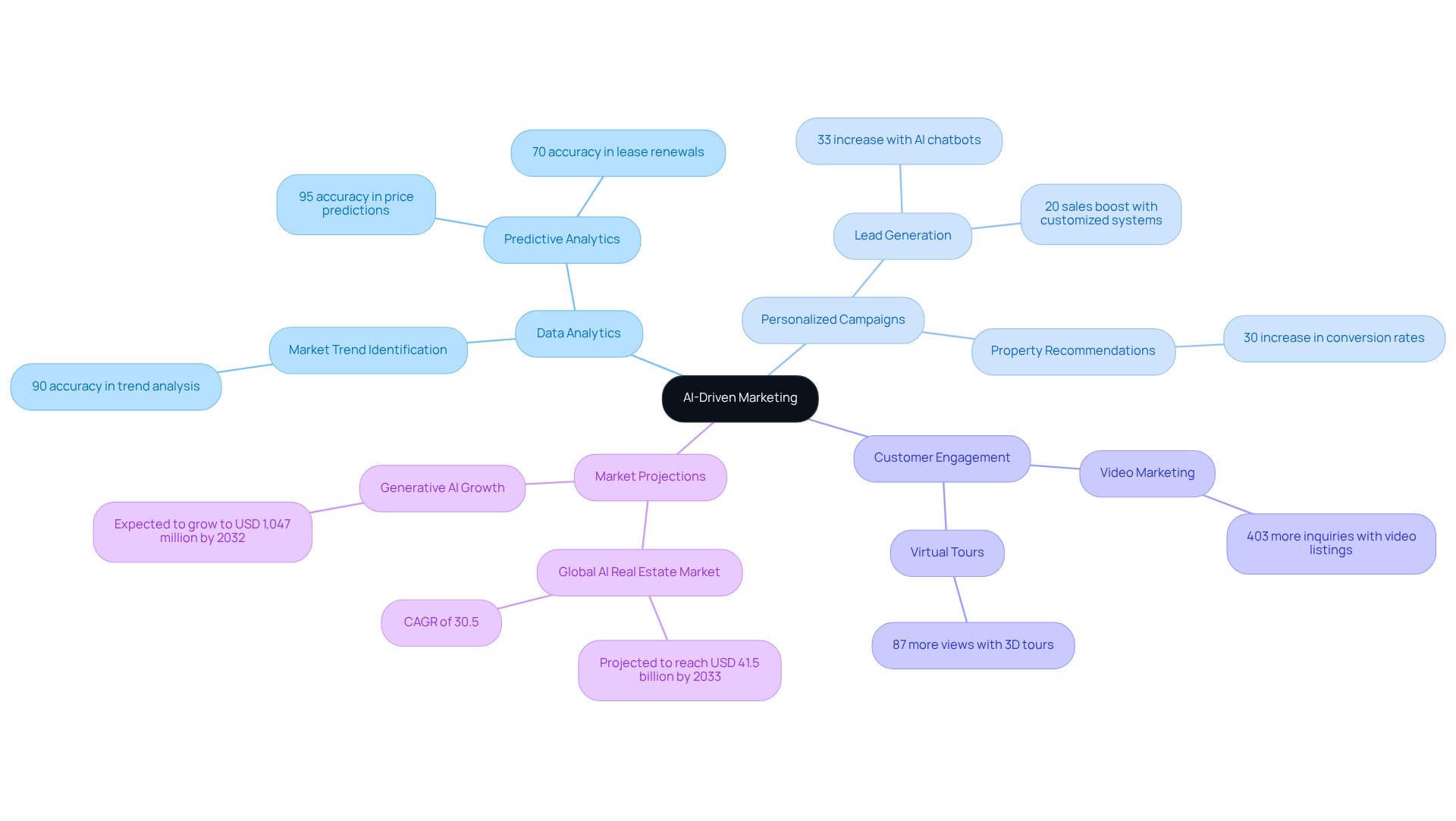
Smart Building Systems: Enhancing Efficiency and Tenant Experience
Smart building systems leverage IoT devices and advanced analytics to optimize operations across various domains, including energy management and security. These systems enable real-time monitoring and control of critical building functions such as lighting, heating, and security, significantly enhancing operational efficiency. For instance, buildings equipped with smart door closers not only bolster security but also contribute to energy conservation by ensuring doors close properly, thus preserving temperature differences and reducing HVAC demand. This integration of intelligent door closers exemplifies how IoT devices can enhance both safety and energy efficiency in smart buildings.
The incorporation of smart technologies leads to substantial cost savings and improved resident experiences. As residents increasingly prioritize contemporary features, landlords who implement these systems gain a competitive edge. A homeowner noted that adopting a comprehensive home automation system resulted in heightened comfort and convenience for residents, ultimately enhancing occupant satisfaction and retention. Stephen Kerr, Technical Director, emphasized that homeowners are seeking high-tech renovations that attract buyers, underscoring the importance of modern solutions in management.
Moreover, the growth of the smart building sector, projected to reach $548.5 billion by 2032, highlights the increasing demand for trends in ai-powered proptech, including enhanced security, energy efficiency, and data-driven decision-making in building management. As real estate owners continue to embrace IoT solutions, the trends in ai-powered proptech will significantly expand the potential for optimizing building operations and enhancing tenant experiences. However, it is crucial to acknowledge the challenges encountered during the installation of smart technologies in older buildings, which can complicate the integration process but ultimately lead to significant benefits.
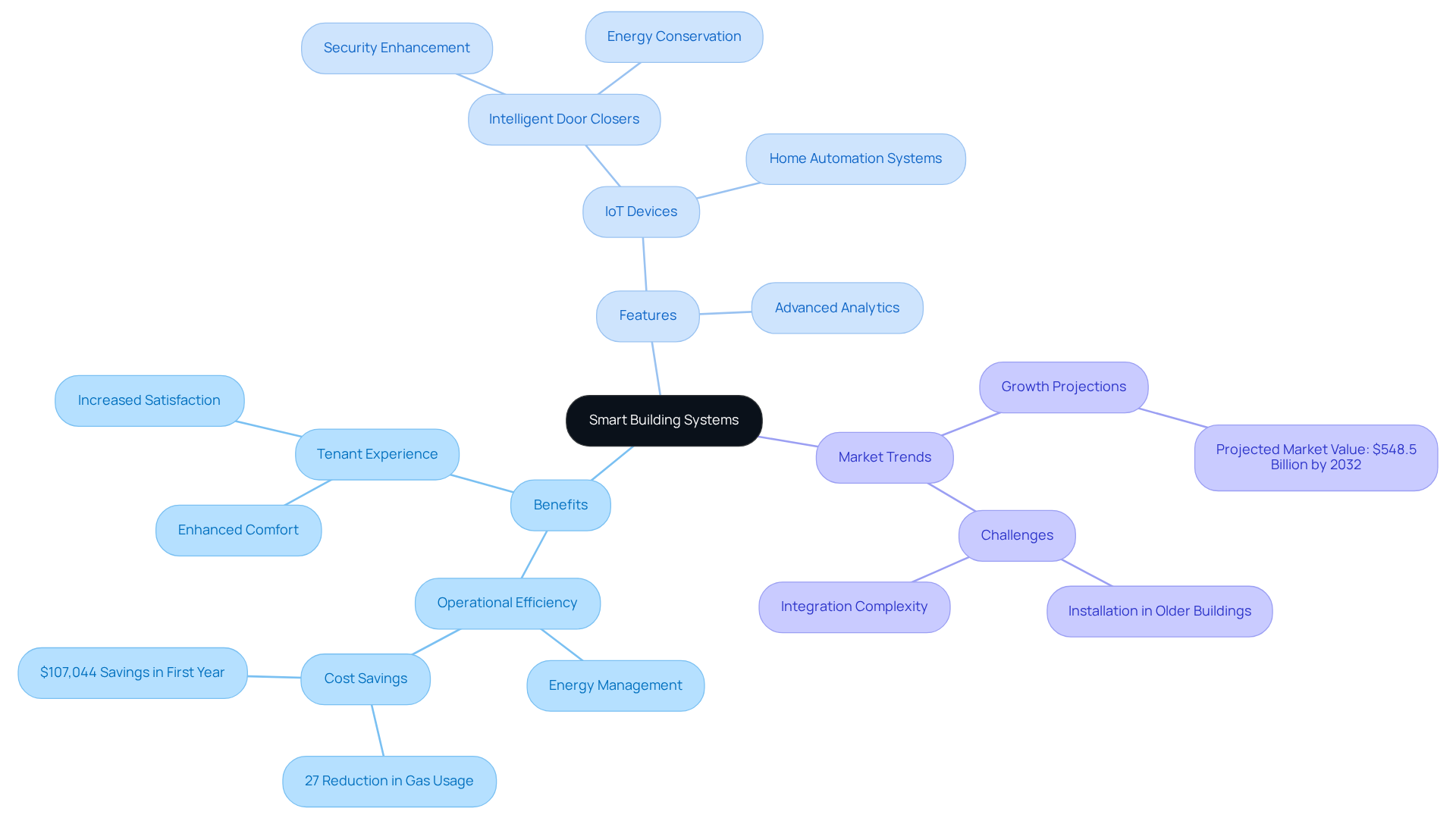
Virtual and Augmented Reality: Transforming Property Tours with Immersive Experiences
Virtual and augmented reality technologies are revolutionizing real estate showcasing. These innovations allow professionals to offer immersive virtual tours, providing clients with a realistic experience of listings without the need for physical visits. This advancement not only saves time but also enables purchasers to explore various listings from the comfort of their homes, significantly enhancing the search process. For instance, listings featuring virtual tours can sell up to 31% faster, attracting more serious inquiries and streamlining the scheduling of in-person visits. Properties equipped with high-quality VR or AR tours experience a reduction of up to 60% in physical visits before purchase or lease decisions.
Furthermore, augmented reality enhances real estate listings by overlaying digital information onto physical spaces, offering valuable insights and engaging experiences for potential buyers. This technology allows prospective renters to visualize various elements of a space, such as layout and design, thereby improving their decision-making process. Realty agents have reported that immersive tours of homes not only enhance client engagement but also boost the overall marketing effectiveness of listings. By integrating high-quality virtual tours and AR features, real estate businesses can significantly elevate their online presence, leading to increased traffic and higher engagement rates.
Success stories abound, with companies like Matterport leveraging AR to provide interactive experiences that captivate potential buyers. Agents utilizing virtual tours have observed a significant increase in listing exposure, with some entries experiencing up to a 90% rise in visibility and over 40% more clicks compared to those lacking such features. As Ketan Kothari noted, "Virtual tours are adding a new dimension to property listings, taking them a notch above traditional static images or videos." As the property market continues to evolve, the incorporation of these technologies is becoming crucial for attracting and retaining clients in a competitive environment.
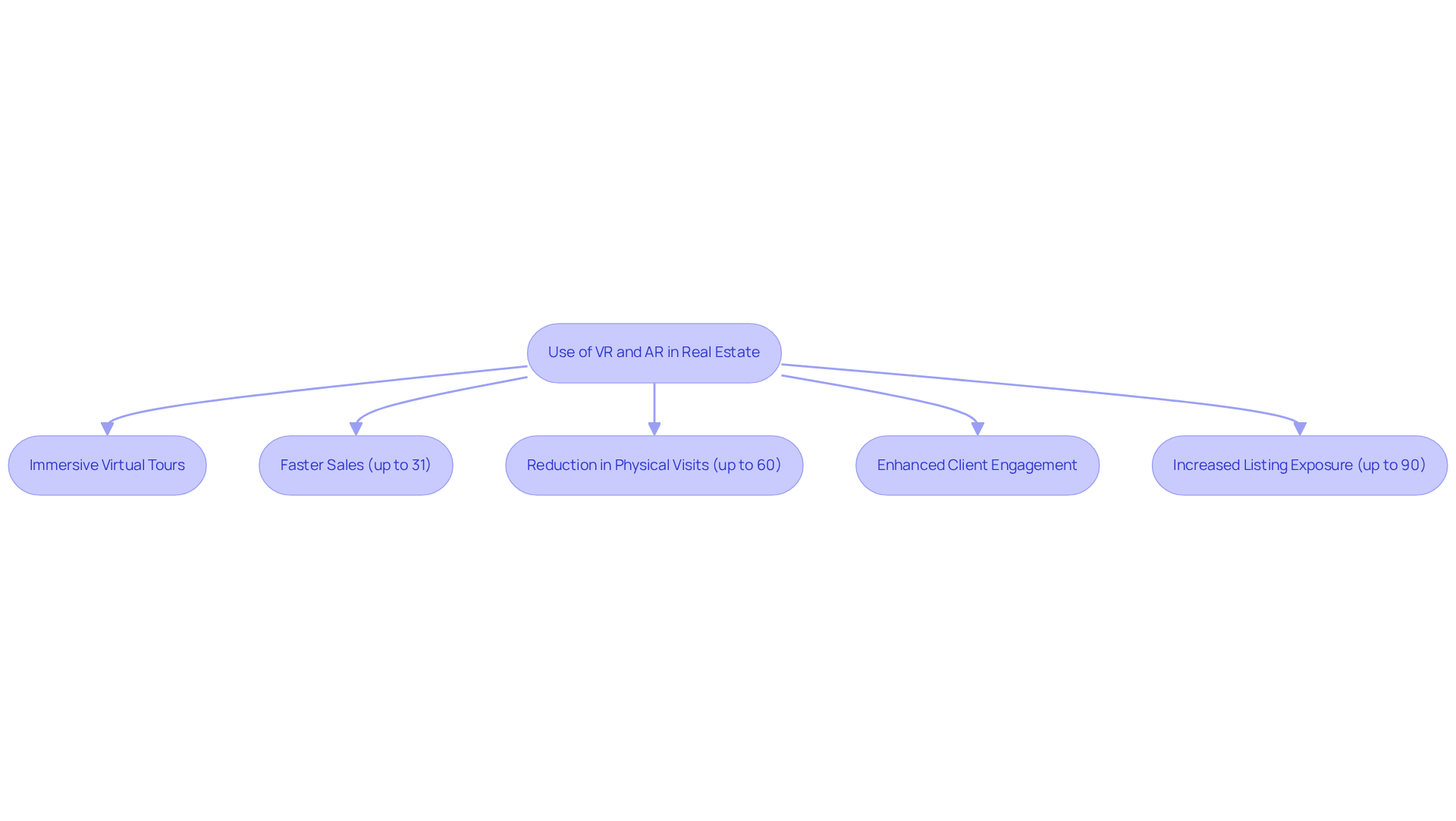
Tech-Enabled Brokerages: Streamlining Operations with Advanced Technologies
Tech-enabled brokerages are harnessing advanced technologies to revolutionize their operations and elevate client services. By integrating CRM systems, data analytics, and AI tools, these brokerages enhance communication, automate routine administrative tasks, and deliver personalized experiences to clients. This technological synergy not only boosts operational efficiency but also empowers agents to concentrate on nurturing relationships and closing deals.
As the real estate landscape continues to evolve, adopting these innovations is crucial for brokerages seeking to maintain a competitive edge. For instance, Radius has demonstrated how its AI-powered CRM and mobile app have significantly improved agent productivity and client satisfaction, allowing agents to retain more revenue while streamlining their workflows. Furthermore, the integration of such technologies is not merely an enhancement; it is a necessity for survival in today's fast-paced market.
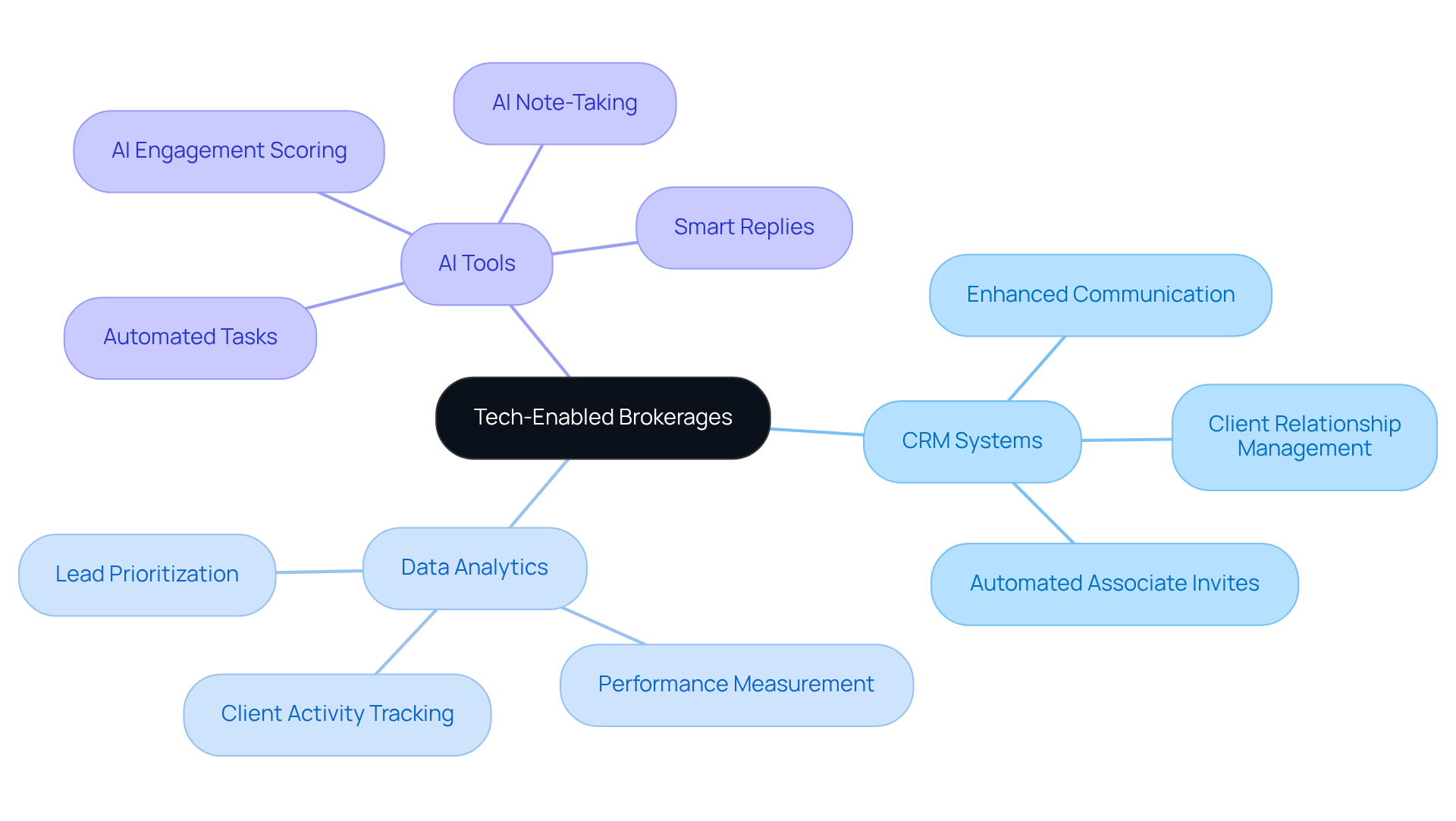
Conclusion
The integration of AI-powered technologies in the property sector is fundamentally reshaping the landscape of title research and real estate management. Machine learning algorithms streamline title document analysis, while blockchain solutions ensure secure transactions. These advancements highlight a transformative shift towards efficiency and reliability, promising to enhance the overall effectiveness of real estate operations. Consequently, they become indispensable tools for professionals in the field.
Key insights illustrate how generative AI is revolutionizing property management through improved customer engagement. In addition, digital twins and smart building systems optimize development processes and tenant experiences. Furthermore, the adoption of predictive analytics and AI-driven marketing strategies empowers property professionals to make data-informed decisions, ultimately driving business success. The emphasis on sustainability through green proptech further underscores the industry's commitment to environmental responsibility.
As the real estate sector embraces these trends, it is crucial for stakeholders to stay informed and adapt to the rapidly changing technological landscape. By leveraging AI and related technologies, real estate professionals can enhance their operational capabilities and position themselves for future success in a competitive market. Embracing these innovations will be essential for navigating the complexities of the industry and meeting the evolving needs of clients.
Frequently Asked Questions
What is Parse AI and how does it assist in title research?
Parse AI is a technology that utilizes advanced machine learning algorithms to analyze and extract critical data from extensive title documents. It significantly reduces the time needed for title research, allowing professionals to focus on more strategic tasks while minimizing human error and enhancing the accuracy of title reports.
How does generative AI improve property management and customer engagement?
Generative AI automates routine tasks and enhances customer interaction in real estate management. AI-driven chatbots manage resident inquiries, schedule maintenance, and provide instant responses, leading to a reported 27% increase in customer satisfaction. Additionally, it analyzes occupant data to tailor communication and marketing strategies, ensuring efficient responses to client needs.
What role does blockchain technology play in real estate transactions?
Blockchain technology provides a secure and immutable ledger for ownership and transaction histories, reducing the risk of fraud and disputes. It allows all parties to verify the authenticity of title documents and utilizes smart contracts to automate transaction processes, streamlining closings and fostering trust among stakeholders.
How does blockchain technology contribute to fraud prevention in real estate?
Blockchain's transparent and tamper-resistant record-keeping significantly reduces property fraud. Case studies indicate that its implementation has led to a notable decrease in deceptive actions within the real estate sector, enhancing overall transaction security.
What are the benefits of using AI-driven chatbots in property management?
AI-driven chatbots improve property management by efficiently handling resident inquiries, providing instant responses, and sending personalized notifications and reminders. This ensures that tenant queries are addressed promptly, allowing property managers to focus on strategic initiatives.




